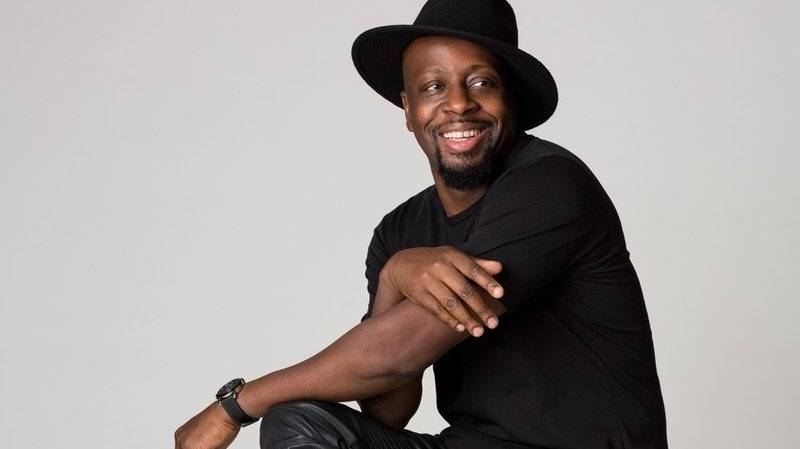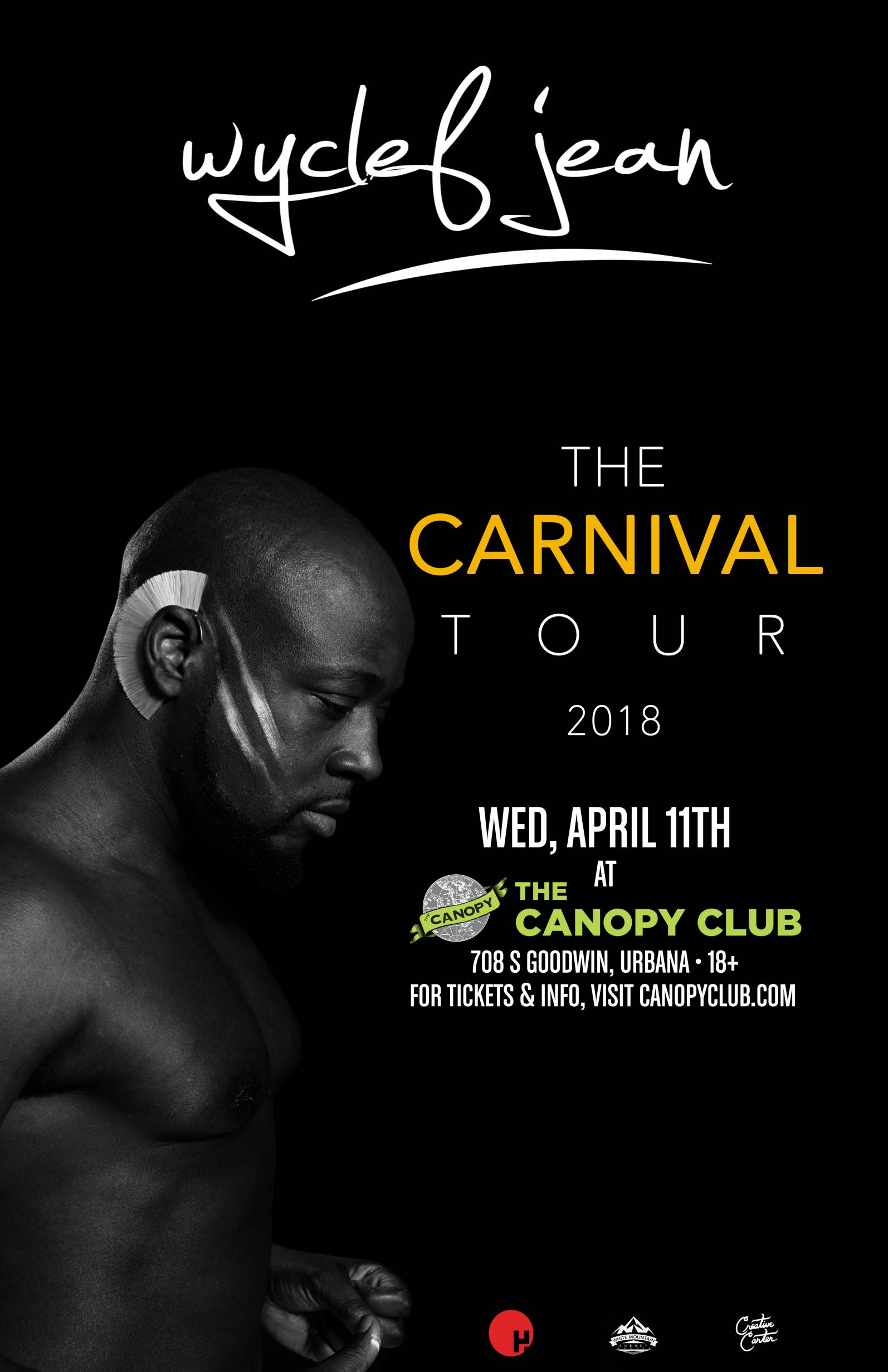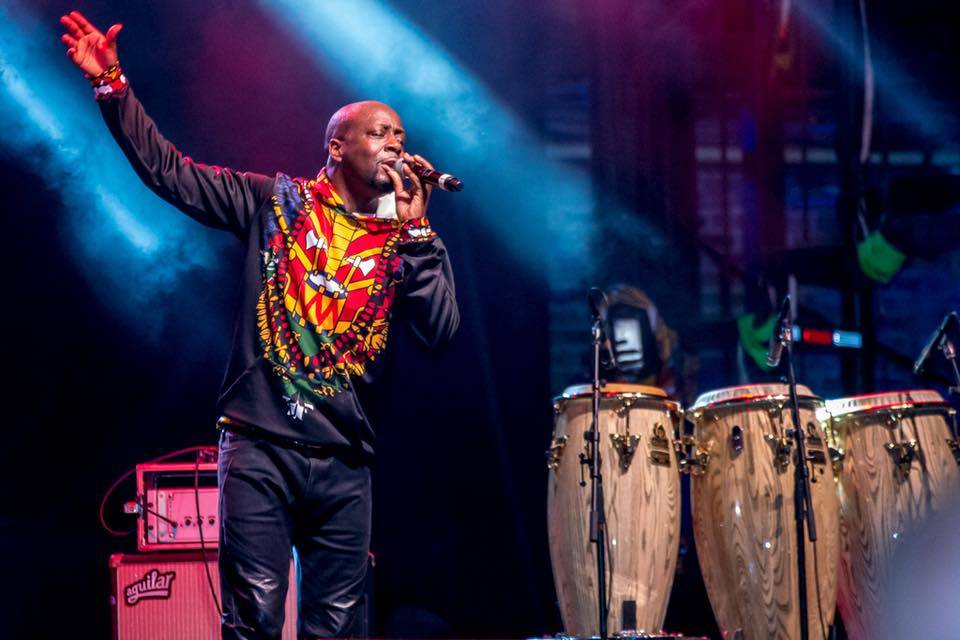Wyclef Jean is performing this Wednesday at Canopy Club, and ahead of his visit, I got a chance to interview him. He waxed poetic about music passing through the generations, commented on trends in hip hop, and even threw some shade.
Jean’s extraordinary resumé charts his progression from growing up without electricity in Haiti, to forming a hip hop group that would shake the earth (see Fugees), to being a Grammy-winning solo artist and producer — and he’s not shy about his opinions he’s picked up along the way.
When I spoke with him, he calls out artists for stealing Caribbean beats without giving credit, and has something to say to his early critics who told him he can’t be a rapper and a singer. After releasing The Score in 1996 — and the Fugees breaking up a year later — Jean evolved into a solo artist and producer. He scored a string of hits throughout the naughts and even made it to #2 on the UK charts just last year being featured in “Dimelo” by Rak-Su.
Lately, he has seemed to be transitioning into the twilight of his career. He has embraced his role as a veteran artist looking to reach back and help new young artists that were inspired by him growing up, and on the road he give the fans all the greatest hits they’ve loved across his career. His latest mixtape, Wyclef Goes Back to School, finds Jean featuring unknown artists he recruited from competitions on college campuses across America. After spending his life absorbing and later paying homage to the legends he grew up listening to, he’s ready to pass down what he’s learned and inspire a new generation of artists.
Smile Politely: On the Carnival tour, you’re promoting your album The Carnival III: The Rise and Fall of a Refugee, the 3rd installment on the Carnival series, which started back with your debut solo album. Is there anything on this album or in this tour that connects this project back to the start of your solo career?
Wyclef Jean: One of my greatest inspirations is Quincy Jones. That’s like my role model. Remember, Quincy did all of Michael Jackson… and all that great work… and Quincy was from a jazz background. That’s similar to me. When I grew up, in high school I was a jazz major. Loved Hip Hop, loved Salsa, Merengue, all of that. But I would say Jazz and Classical helped shape my life. The thing with The Carnival III — remember when Q produced all of these records, he was like “man, I gotta hit a tour and let people know the man behind these records”. This tour makes a connection with the older fans, fans from the Score and different things, but also all these new millenials that just discovered me. So the man behind the music is Wyclef Jean. You’re coming to see the man behind Lauryn Hill, the man behind Destiny’s Child, the man behind Whitney Houston, the man behind Carlos Santana. The Carnival man.
SP: Many have noticed there’s been a big uptick in Caribbean influence in hip hop and pop music in the last several years. Drake, Rihanna, Justin Bieber — they’re all using dembow beats. What do you think about that trend?
Jean: It’s exposing music to a different part of the world. If you notice, Afro Beat is also becoming bigger and bigger, and I think through the internet the exposure is much greater. But the only thing I would always say is — and I do it in my music and will continue doing it — if the artist is alive and you sample it or you use parts of the artists’ music, at least give the artist a shot. If you’re doing the Grammys or doing big award shows and you stole this rhythm from Trinidad, at least put some Calypso dudes in there. Fly some people in. You already made it. If you’re exposing the music, at least show where it comes from. At the end of the day, if it sounds like Beenie Man, then give Beenie Man 8 bars on the remix, dog. You already eating. The record’s already big. I loved when Drake shot his video in Jamaica. He just brings another side of exposure which is needed for the island. And that’s how you pass it down. Look at the Fugees — we paid tribute to Bob Marley, Roberta Flack, and that’s why we’re still here. That’s why Young Thug can have a song called “Wyclef Jean”. He’s paying homage to me the same way I paid homage to Bob Marley. The ones that last long understand that science.
SP: Since you were a member of the legendary hip hop group the Fugees, I wanted to ask about the group format in hip hop. In the 80’s and 90’s, rap groups were common and popular, from Run DMC to NWA to Beastie Boys to Wu Tang Clan, but somewhere around the turn of the century that trend went away. Recently some groups have come up, like Migos, Rae Sremmurd, and Brockhampton. Do you think we’ll see more groups having success again in the future?
Jean: My theory is not that it went away, it just changed. Let me show you the science. When you look at Drake, Nikki Minaj, and Lil Wayne, at one time it looked like it was a group. The name “group” just changed into “collabo”. In the era after the Fugees, a lot more people were collaborating on movements. We’re in the era where Future and Young Thug can do a song together, and then do a whole mixtape together. What Migos did was take it back to the actual combination of the entire group, but if you think about it, the reason why the name “group” went away was just because everyone started doing more collabos with everyone.
SP: Like how after the Fugees broke up, you had the Refugee All Stars, which was an album of collabs with a bunch of people including other Fugees.
Jean: That’s exactly what’s going on. Everyone is clicked up, and every combination of artists is a different formula… Like right now my new single is called “Sak Kap Fet” and it’s burning the internet. It’s me and this kid called Kofi Black. Me and Kofi Black, we clicked up with a girl named Moira Mack, and she’s coming in singing the ad libs on this. So some people can hear that and say “this is a Fugee style formula”.

SP: The concept behind your new mixtape Wyclef Goes Back to School was to find talent from college students around the US. How did you find who you wanted to feature on the album?
Jean: Check out my Instagram, we got a whole movement going on. I feel like a lot of raw talent now is getting lost. Some of the best talent online don’t even have 1 view. They don’t care about that, they just go and do their music. So I went out there and said I’m gonna find raw talent. It’s crazy, “Sak Kap Fet” is number 31 on iTunes and it’s featuring Moira Mack. Who is Moira Mack? She’s a girl that goes to USC. She won the competition, we found her, and all of the sudden her name is on the iTunes charts.
SP: You reached a massive audience as a singer and rapper, but many might not know you have solid chops as a multi instrumentalist. When and how did you learn so many instruments?
Jean: The gift of the instrumentation really comes from the church. Growing up in my father’s church, being in the hood, when the organ shows up and you’re the first son, it’s like man “you gotta learn this organ”. And you start off playing horrible. And then it’s drums, and it’s bass, and so on. So in the hood, when my boys were playing Nintendo 24/7, or playing ball — my brother who’s a lawyer now, all he used to do was read books all day — and all I used to do was sit there with my cassette tapes and try to learn the songs all day. I was just fascinated with sound.
SP: Nowadays someone singing and rapping has become common place, but not too long ago artists like Drake faced a lot of push back. You were already singing and rapping back in the 90s. Did you experience a push back like that too?
Jean: Big time. Same thing Drake went through, I went through. One of his favorite blueprints was Carnival 1. They used another word for it for me when I was doing it. They’d say “he’s not hip hop, he’s alternative”, and I was like “what the fuck does that mean?” So people from the ghetto can’t sing and rap, they can’t play instruments, they can’t do choreography. I was like, who is making these rules? At the time they had “Keep It Real Syndrome”. And the “Keep It Real Syndrome” is the reason why a lot of rappers from the 90s are struggling today. The idea was to constantly keep evolving. If we grew up digging in the crates with Earth Wind & Fire, Bob Marley, Diana Ross, and Jackson 5 why wouldn’t we be trying to rap monotone and then sing too? To me that was just something that was natural, but dudes would be like “if you’re a singer, you can’t be a rapper”. You know what? I turned out to be one of the most lethal battle rappers in my era. And that be the truth, because they’d be underestimating you thinking you’re going to sing “Somewhere Over the Rainbow” or something, but the bars is kicking their ass.
SP: You mentioned Bob Marley there, and I know you’ve done famous Bob Marley covers and you like to perform them too, and Haitian and Jamaican music share a lot of characteristics and history. You grew up in Haiti until you were 9 without electricity in the 70s while Bob Marley was at the height of his international stardom. When you lived in Haiti did you know about him, or did that become a big inspiration after you came to America?
Jean: No clue. I didn’t know who Bob Marley was or nobody. When I came to America and lived in the projects, there was a few introductions to music. One was the Bob Marley Exodus cassette, another was Police Synchronicity, the other was Pink Floyd The Wall, and then Bob Dylan. I was like “who the hell is this guy?”, ya know? All of that music was discovered in America. In Haiti as a little kid I would sing in the village, and the village would echo. I would sing to the songs of the congas, the sound of the tanbous, we would called them. What Haiti gave me is that raw, natural — like when I be singing, that thing you be hearing in my voice, you be like “yo, this dude sounds like marijuana”. It’s that feeling, you know what I’m saying?
Wyclef Jean’s The Carnival tour hits Urbana Wednesday, April 11 with Culture Crew. The show starts at 7:30 p.m., and tickets are $30 in advance and $35 at the door.









